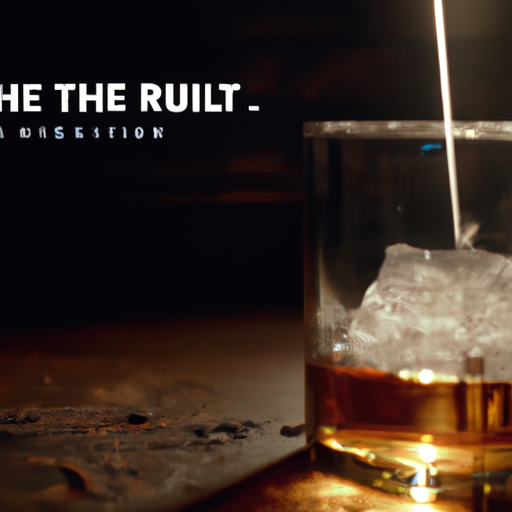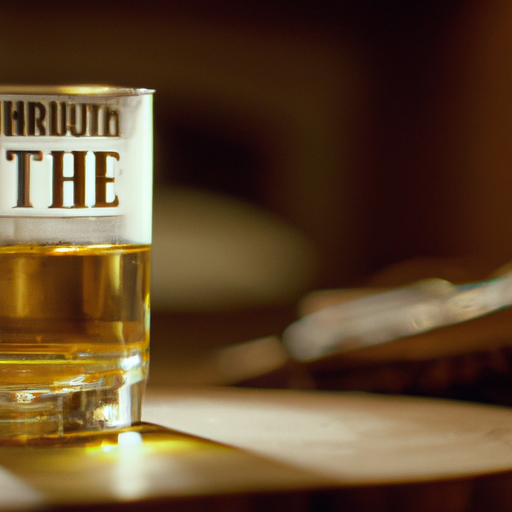
The Origins of Medicinal Whiskey: Separating Fact from Fiction
Unveiling the Truth: Debunking the Medicinal Whiskey Myth
The Origins of Medicinal Whiskey: Separating Fact from Fiction
Whiskey, a beloved spirit enjoyed by many, has a long and storied history. Throughout the years, various claims have been made about its medicinal properties. But how much truth is there to these assertions? In this article, we will delve into the origins of medicinal whiskey and separate fact from fiction.
One of the most common claims surrounding medicinal whiskey is its ability to cure ailments. It is often said that during the Prohibition era in the United States, doctors would prescribe whiskey to their patients as a remedy for various illnesses. While it is true that alcohol was prescribed during this time, it was not solely whiskey that was used. In fact, any form of alcohol was considered a suitable substitute. This was due to the belief that alcohol had antiseptic properties and could help fight off infections. However, it is important to note that this practice was not exclusive to whiskey and was eventually phased out as more effective treatments became available.
Another claim often made about medicinal whiskey is its ability to alleviate pain. It is said that whiskey can act as a natural painkiller, providing relief to those suffering from various ailments. While it is true that alcohol can have a numbing effect, it is not a recommended method for pain management. In fact, excessive alcohol consumption can lead to a host of health problems, including addiction and liver damage. Therefore, it is important to seek proper medical advice and treatment for pain relief rather than relying on whiskey as a remedy.
Furthermore, some believe that whiskey can help with digestion. It is often said that a small amount of whiskey after a meal can aid in the digestion process. While alcohol can stimulate the production of gastric acid, which aids in digestion, it is not a recommended method for improving digestive health. Excessive alcohol consumption can actually lead to digestive issues such as acid reflux and gastritis. Therefore, it is best to rely on a balanced diet and proper lifestyle choices for optimal digestive health.
Additionally, there are claims that whiskey can help prevent the common cold. It is often said that a hot toddy, a mixture of whiskey, hot water, honey, and lemon, can help soothe a sore throat and alleviate cold symptoms. While the warm liquid can provide temporary relief, there is no scientific evidence to support the claim that whiskey can prevent or cure the common cold. It is important to rely on proven methods such as proper hygiene and vaccination to prevent the spread of cold viruses.
In conclusion, while whiskey may have been used in the past for medicinal purposes, many of the claims surrounding its health benefits are unfounded. It is important to separate fact from fiction when it comes to the origins of medicinal whiskey. While alcohol may have some temporary effects, relying on whiskey as a remedy for various ailments can lead to more harm than good. It is always best to seek proper medical advice and treatment for any health concerns.
Examining the Historical Context: Medicinal Whiskey and Prohibition

Unveiling the Truth: Debunking the Medicinal Whiskey Myth
Examining the Historical Context: Medicinal Whiskey and Prohibition
In the early 20th century, the United States experienced a tumultuous period known as Prohibition. This era, which lasted from 1920 to 1933, saw the nationwide ban on the production, sale, and distribution of alcoholic beverages. However, there was a notable exception to this ban: medicinal whiskey. It is often believed that doctors prescribed whiskey as a cure-all during this time, but is there any truth to this popular myth?
To understand the role of medicinal whiskey during Prohibition, it is crucial to delve into the historical context. The temperance movement, which gained significant momentum in the late 19th and early 20th centuries, advocated for the complete eradication of alcohol due to its perceived negative effects on society. This movement eventually led to the ratification of the 18th Amendment, which prohibited the manufacture, sale, and transportation of alcoholic beverages.
However, recognizing the potential dangers of a complete alcohol ban, the government made an exception for medicinal purposes. Under the Volstead Act, physicians were allowed to prescribe whiskey and other alcoholic beverages to patients for specific medical conditions. This exception was based on the belief that alcohol had therapeutic properties and could be used as a treatment for various ailments.
While it is true that doctors were able to prescribe medicinal whiskey, it is important to note that this practice was heavily regulated. Physicians had to obtain a special permit from the government, and prescriptions were closely monitored. The government strictly controlled the production and distribution of medicinal whiskey, ensuring that it was not misused or diverted for recreational purposes.
Contrary to popular belief, medicinal whiskey was not a panacea for all ailments. Doctors prescribed it primarily for conditions such as anxiety, insomnia, and digestive disorders. It was believed that small doses of alcohol could provide relief for these ailments, acting as a sedative or digestive aid. However, the medical community was divided on the efficacy of alcohol as a treatment, and many physicians preferred alternative remedies.
Furthermore, the use of medicinal whiskey was not without controversy. Critics argued that the exception for medicinal purposes was merely a loophole that allowed individuals to continue consuming alcohol illegally. Some doctors were accused of overprescribing whiskey, leading to abuse and addiction. The government responded by implementing stricter regulations and cracking down on doctors who abused their prescribing privileges.
As Prohibition progressed, the demand for medicinal whiskey skyrocketed. This led to the rise of “medicinal whiskey mills,” where unscrupulous individuals exploited the system by producing and distributing counterfeit prescriptions. These mills operated under the guise of legitimate medical practices but were essentially illegal alcohol operations.
In conclusion, the myth that doctors prescribed whiskey as a cure-all during Prohibition is not entirely accurate. While medicinal whiskey was indeed prescribed for certain medical conditions, its use was heavily regulated, and it was not a universally accepted treatment. The exception for medicinal purposes was a compromise made during a time of social and political upheaval, and it was not without its controversies and abuses. Understanding the historical context of medicinal whiskey during Prohibition helps to debunk the myth and shed light on the complexities of this era in American history.
Scientific Evidence: Debunking the Health Benefits of Medicinal Whiskey
Unveiling the Truth: Debunking the Medicinal Whiskey Myth
Scientific Evidence: Debunking the Health Benefits of Medicinal Whiskey
Whiskey, a beloved spirit enjoyed by many, has long been associated with various health benefits. From soothing a sore throat to aiding digestion, the medicinal properties of whiskey have been touted for centuries. However, when we delve into the scientific evidence, it becomes clear that these claims are nothing more than myths.
One of the most common claims surrounding medicinal whiskey is its ability to alleviate cold symptoms. It is often believed that a hot toddy, a mixture of whiskey, hot water, lemon, and honey, can help soothe a sore throat and relieve congestion. While the warm liquid may provide temporary relief, it is not the whiskey itself that is responsible for these effects. In fact, the alcohol in whiskey can actually dehydrate the body, worsening cold symptoms in the long run.
Another popular belief is that whiskey can aid digestion. It is often recommended as an after-dinner drink to help settle the stomach. However, scientific studies have shown that alcohol, including whiskey, can actually increase the production of stomach acid, leading to heartburn and indigestion. Furthermore, excessive alcohol consumption can damage the lining of the stomach and intestines, leading to more serious digestive issues in the long term.
Some proponents of medicinal whiskey claim that it can help improve cardiovascular health. They argue that moderate consumption of whiskey can increase good cholesterol levels and reduce the risk of heart disease. While it is true that moderate alcohol consumption has been associated with some cardiovascular benefits, the same benefits can be achieved through other means, such as regular exercise and a healthy diet. Additionally, excessive alcohol consumption can have detrimental effects on the cardiovascular system, increasing the risk of high blood pressure, stroke, and heart failure.
One of the most persistent myths surrounding medicinal whiskey is its alleged ability to cure a hangover. Many people believe that a hair of the dog, a shot of whiskey in the morning after a night of heavy drinking, can alleviate hangover symptoms. However, this is nothing more than a temporary relief. Alcohol is a diuretic, meaning it increases urine production and leads to dehydration. Drinking more alcohol the next day may temporarily alleviate symptoms by numbing the body, but it does not address the underlying cause of the hangover. In fact, it can prolong the recovery process and lead to more severe hangover symptoms later on.
In conclusion, the claims surrounding the medicinal properties of whiskey are largely unfounded when examined through the lens of scientific evidence. While whiskey may provide temporary relief for certain symptoms, such as a sore throat or congestion, it is not a cure-all remedy. In fact, excessive alcohol consumption can have detrimental effects on various aspects of health, including digestion, cardiovascular health, and overall well-being. It is important to approach alcohol consumption, including whiskey, with moderation and to rely on evidence-based treatments for any health concerns.






